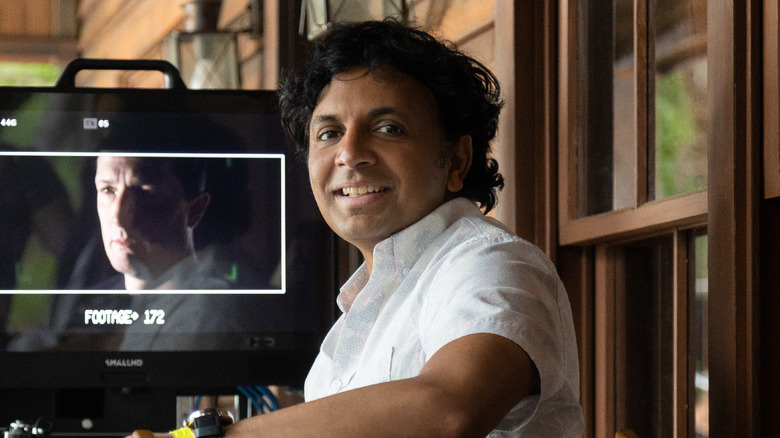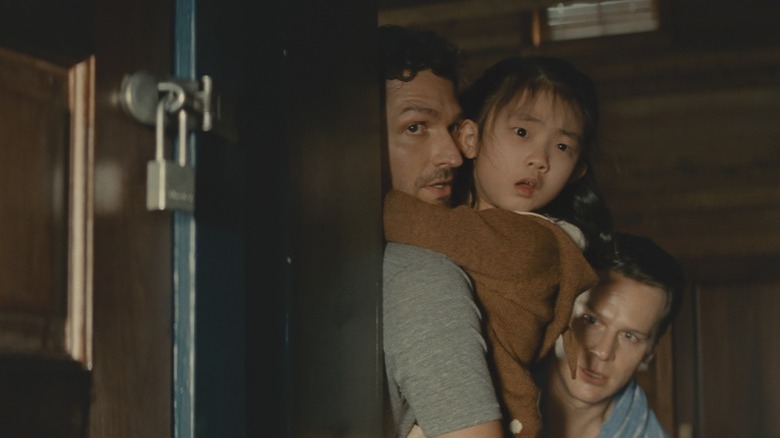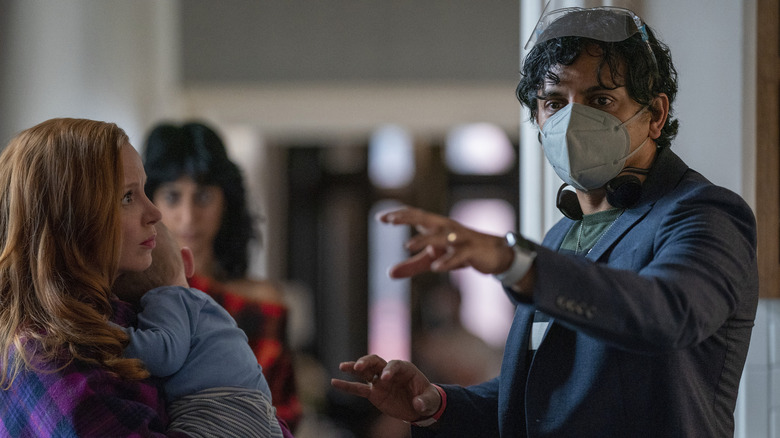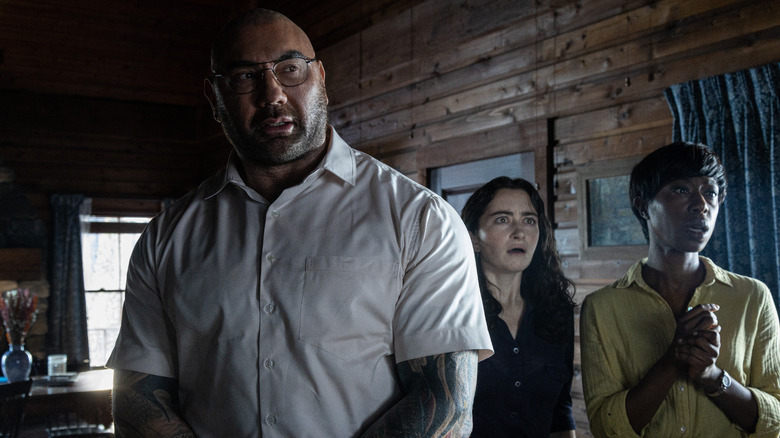M. Night Shyamalan On Making Knock At The Cabin And Putting His Trust In Dave Bautista - Exclusive Interview
For his 15th feature film as a writer and director, M. Night Shyamalan did something he's only done one other time in his career: adapted an existing piece of material. That first one, "The Last Airbender," didn't work out so well. But in the case of his new movie, "Knock at the Cabin," he's adapted acclaimed horror writer Paul Tremblay's novel "The Cabin at the End of the World," with what's looking like far more successful results. Initially approached to produce an already existing screenplay, Shyamalan was so taken with the story that he eventually came around to rewriting it and helming the picture himself.
On paper, it seems like a perfect match of material and filmmaker: "Knock at the Cabin" is a tense thriller that tackles questions of faith, responsibility, and family against a backdrop that is both vast and intimate. Eric (Jonathan Groff), Andrew (Ben Aldridge), and their adopted daughter, Wen (Kristen Cui), are vacationing at a secluded cabin when four strangers — armed with frightening homemade weapons — invade the house and trap the family. Their leader, Leonard (Dave Bautista), then calmly explains that the three of them must make an agonizing choice — and if they don't, the world will come to an end.
What happens next is terrifying, thought-provoking, and — for most of the way — largely faithful to Tremblay's book and themes. "It was an interesting mix of taking an author's characters and then going in a new direction in this movie," says Shyamalan in Looper's exclusive interview. Best known for his classics "The Sixth Sense," "Unbreakable," and "Signs," Shyamalan has more recently been on a hot streak with his dark superhero sequels "Split" and "Glass," as well as his sci-fi/horror hybrid "Old" and the Apple TV+ supernatural series "Servant."
Why Shyamalan decided to direct Knock at the Cabin himself
You just initially were going to produce this through your company, and then at some point, you decided you wanted to work on the script and direct it yourself. Walk us through that decision.
I'm in this wonderful place where people bring me things, or filmmakers come and they want to join forces and tell stories together, which I love so much and I'm so excited. I want to do a lot of that in the future. In this case, this group of filmmakers came and they said, "Will you produce this movie?"
I read the screenplay that they were going to use, and it was a straight adaptation of this wonderful book, and I felt two things at once. I felt like the premise of the book was extraordinary. I thought it was a profound premise. I also felt that the story went left at a very critical moment and never returned from that. I said to them I felt that I couldn't tell that story, and for the audience that comes to my movies, I would feel [that story] doesn't represent me. And I said, "But I wish you the best."
They were such lovely people, and they went to go make the movie, and it didn't happen. Then eventually, the owners of the book came back and said, "We would love to hear your take on it." I said, "I would just keep going with the premise and get to the point where they make a decision, yes or no." They said, "We'd love that." So I thought about it and said, "Should I produce it or should I write and direct it?" And then I went, "God, I love this story," so I just did it myself.
How Servant helped Shyamalan with Knock at the Cabin
This is only the second time you've directed something based on other material. Do you use a different set of creative muscles to adapt a book or preexisting content?
When you say it like that, it just popped into my head that I guess I was [also adapting material] with "Servant," which was a set of characters and a premise that was brought to me by Tony Basgallop, who wrote the original pilot for the show. For years and years, I had been coming up with ideas based on that premise and based on those characters.
I'd say, "I have an idea. Let's have the characters all around the car, outside on the street." Or I would [say], "I want this movement for the characters." I've been doing it for years already, and there is a little bit of freedom in that, [which] makes it feel slightly separated from me as a human being [so] that I can actually see it a tiny bit clearer.
["Knock at the Cabin"] was an interesting mix of taking an author's characters and then going in a new direction. It felt like those muscles I've been using on "Servant."
M. Night Shyamalan trusted his instincts about Dave Bautista
Everyone is so good in this movie, and Dave Bautista really knocks it out of the park. He's been known for certain types of roles up to this point and had an entirely different career [as a wrestler] before acting. What did he bring to the table, and do you think people have underestimated him as an actor?
Sometimes the system doesn't allow [people] to do the thing that makes them really, really special, and sometimes with very talented people, they've used their other muscles to be successful in the system, and they feel weirdly not seen. And Dave would be an example of someone that has achieved so much in one area of entertainment, but inside he wanted to be a different thing. I think he [was] scared [about] whether he could make this turn, and I wasn't. I saw in him a man of great ethics and artistic merit, and all of his achievements in this other field, frankly, were irrelevant to me, completely irrelevant. They were neither good nor bad to me. They're unimportant to why I was casting him in this movie.
I cast him for two reasons. I saw him in "Blade Runner 2049," and I thought there was something extraordinary about this individual. And then when I met him, I thought he was in the right place in his life to commit in the way that I ask actors to commit to my movies, and I was right. He's a rare, rare individual, and I'm super lucky.
"Knock at the Cabin" opens in theaters on February 3.
This interview has been edited for clarity.



